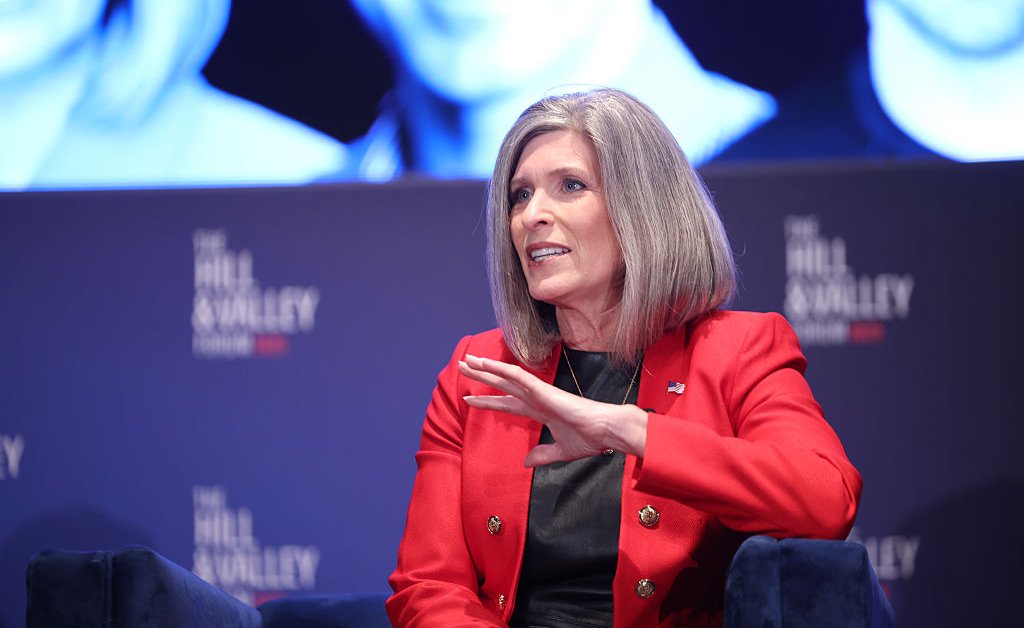This article is part of The D.C. Brief, TIME’s politics newsletter. Sign up here to get stories like this sent to your inbox.
Donald Trump’s demand for a sprawling legislative package of expensive tax cuts and big spending reductions is running into trouble as even his strongest Republican allies are having a tough time defending it.
Sen. Joni Ernst of Iowa leaned into tongue-in-cheek gallows humor last week, telling an audience “Well, we all are going to die,” in response to concerns that kicking millions off Medicaid would lead to more deaths. House Speaker Mike Johnson, meanwhile, is simply repeating the inaccurate statements that the White House keeps putting out, asserting—very wrongly—on Sunday that “we’re not cutting Medicaid,” and last month claiming that the bill’s deepest cuts would target migrants in the country without proper documentation. “The numbers of Americans who are affected are those that are entwined in our work to eliminate fraud, waste and abuse. So, what do I mean by that? You got more than 1.4 million illegal aliens on Medicaid,” Johnson said on CNN on May 25. And just this week, he told NBC another disproven assertion: “I am telling you this is going to reduce the deficit.”
It all points to how openly frustrated Republicans on Capitol Hill are about walking a plank of their own making. Trump’s demands to take on his second-term agenda in one bite has boxed in his party and they’re plenty steamed about the blatant lack of an off-ramp. As one Hill aide put it to me, it’s like watching what can most generously be called an “Ostrich Strategy”—head in the sand, hoping no one notices the reality happening above ground.
The fissures are there for anyone who dares see them. Sen. John Hawley of Missouri on Monday said the President had told him not to cut Medicaid benefits, despite the House-passed version doing exactly that with Trump’s enthusiastic endorsement. The so-called Medicaid Moderates like Sens. Susan Collins of Maine and Lisa Murkowski of Alaska have already balked at the House’s version, which the non-partisan Congressional Budget Office says would boot roughly 10 million people from current coverage.
But other Republicans, like Sens. Rick Scott of Florida and Mike Lee of Utah, have a very different complaint—that the bill doesn’t cut enough. Sen. Ron Johnson of Wisconsin says he would be fine leaving his seat if it means tanking a proposal that would balloon the debt by over $1 trillion even when factoring in economic growth. Sen. Rand Paul is objecting to a provision that increases the credit limit on the national credit card to cover purchases already made, also known as raising the debt ceiling.
And these are nominal Trump allies.
These big-ticket ideas rise and fall on salesmanship. At the height of debate over the Affordable Care Act, as Republicans were making hay out of so-called death panels, then-White House adviser David Axelrod had to tell President Barack Obama a hard truth: “A whole bunch of facts and figures won’t change that” opposition. Eventually, Obama’s flood-the-zone approach powered Obamacare across the finish line, but it was plenty messy. The measure has proven durable because its benefits were tangible, and voters seldom surrender benefits.
But that is not the norm. The wasteland of these policy failures is crowded. Bill Clinton’s attempts to overhaul health care in the 1990s doomed his fellow Democrats to a hellish 1994 midterm cycle. George W. Bush’s efforts to privatize Social Security after his re-election bid ran headlong into a woodchipper. Obama’s second-term quest at a border bill similarly crashed into unbending opposition. Trump’s first-term Infrastructure Week never really got off the ground as he lurched from tweet to tweet.
Which explains why so many Republicans are squeamish about this current package. As passed by the House, Medicaid spending would be cut by at least $600 billion over a decade, reducing the rolls by 10.3 million people. The biggest chunk of that, $280 billion, would come from requiring Medicaid recipients to prove they are working. That work requirement is seen as bureaucratic red tape targeting a small pool of able-bodied participants who aren’t currently working, while potentially kicking out many others who are already working but making too little to afford health coverage.
Ultimately, this is going to come down to a simple truth in politics: the biggest bullhorn wins. With an ambitious timeline of getting the “big beautiful bill” to the White House for the President’s signature by the July 4 holiday, Senate Majority Leader John Thune has to work fast. The House bill as it arrived cannot pass, meaning the Senate needs to take up the shell and do a pretty hefty rewrite. Working with a 53-vote GOP majority in a 100-member chamber, Republicans are working under a rule loophole that will allow them to get to the finish line with a bare majority, and a tie-breaking vote from Vice President J.D. Vance if needed. That means Thune can lose just three of his own, and there are at least five nos at the moment, with a few others hinting that they want their seat at the rewrite table.
Republicans have ownership of the House, Senate and White House. That doesn’t mean they have control over every corner of them.
Make sense of what matters in Washington. Sign up for the D.C. Brief newsletter.
Read the full article here


